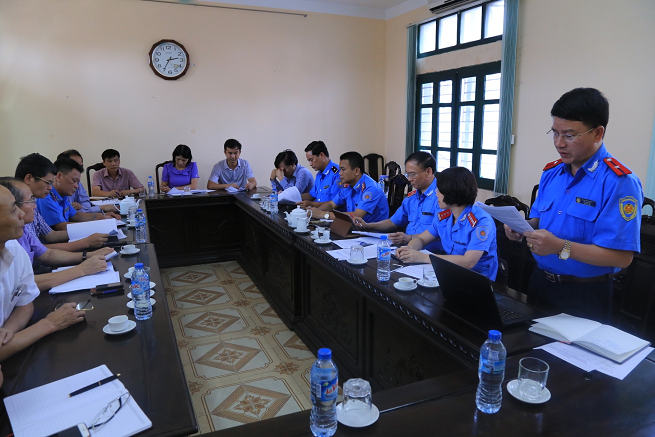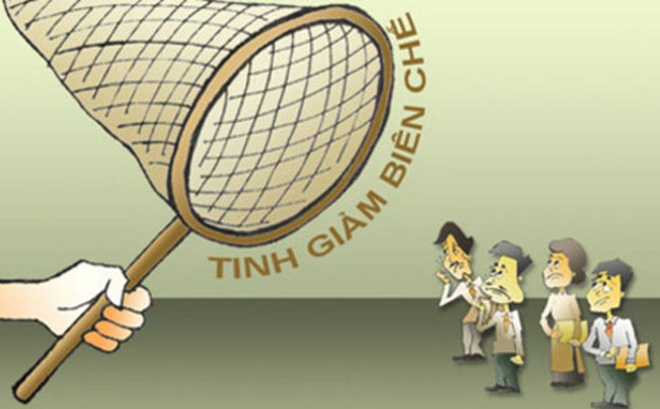Law Secretary would like to introduce to our Esteemed Customers and Members the remaining 09 new proposals related to all officials and public employees in the Draft Law amending and supplementing a number of articles of the Law on Officials and the Law on Public Employees, expected to take effect from January 01, 2020.
10. Evaluation of the Performance of Officials Through Specific Tasks and Products
According to Clause 10, Article 1 of the Draft amending and supplementing Article 56 of the Law on Cadres and Officials 2008, the contents for evaluating officials include:
- Compliance with the guidelines, policies of the Communist Party, laws of the State, regulations of the agency, organization or unit;
- Political qualities, ethics, lifestyle, working style, and manner;
- Competence, professional qualifications, expertise;
*- Results of task performance as per the law, according to the set plan, or specific assigned tasks; progress and quality of task performance. The evaluation of task performance must be linked to the position, demonstrated through specific tasks and products.
- Sense of responsibility and coordination in performing tasks.
Thus, to make the evaluation of officials' work quality clear, accurate, and fair, the results of officials' task performance must be demonstrated through specific products.
Besides the above evaluation contents, the Draft also stipulates that for positions in contact with the public and businesses, officials must also be evaluated through their service attitude towards the public and businesses.
11. Officials Disciplined by Dismissal Can Still Be Re-appointed
To be specific, according to Clause 15, Article 1 of the Draft amending and supplementing Clauses 2 and 3 of Article 82 of the Law on Officials 2008, officials disciplined from reprimand to dismissal will not undergo rank promotion, planning, training, appointment to higher positions within 12 months from the effective date of the disciplinary decision; after this period, if the officials do not commit violations warranting disciplinary action, they will continue to undergo rank promotion, planning, training, and appointment according to the law. This means that disciplined officials will not be appointed to higher positions but can still be considered for re-appointment or assigned to lower positions.
The current provision in the Law on Officials 2008 states that officials disciplined from reprimand to dismissal are automatically not re-appointed.
Additionally, the Draft stipulates that officials in the disciplinary process, under investigation, prosecution, or trial will not be nominated, appointed, transferred, seconded, or trained but will be considered for retirement. (according to the current regulation, these people will not be considered for retirement).
12. Supplemented Policies for Talented Officials
To be specific, according to Clause 2, Article 1 of the Draft amending and supplementing Article 6 of the Law on Officials 2008, the State has policies to detect, attract, nurture, utilize, and provide appropriate remuneration for talented individuals.
According to this Draft, from 2020, it will assign the Government of Vietnam to stipulate details on the framework mechanism, policies to attract, and remuneration policies for talented individuals.
Based on the regulations of the Government of Vietnam, the head of the agency managing officials will stipulate the policies for the use and remuneration of talented individuals applicable to their managed agencies, organizations, or units.
Thus, if this content in the Draft is approved, from January 1, 2020, there will be more specific regulations and policies regarding the use and remuneration of talented officials.
13. New Regulations on Officials' Evaluation Classification
To be specific, according to the provisions of Clause 3, Article 1 of the Draft amending Article 29 of the Law on Officials 2008, based on the evaluation results, officials are classified into the following categories: a) Excellently completing tasks; b) Well completing tasks; c) Completing tasks; d) Not completing tasks.
Thus, compared to the current regulations in the Law on Officials 2008, the Draft omits the phrase "but still limited in capability" from the task completion evaluation results for officials.
Similarly, Clause 11, Article 1 of the Draft amending and supplementing Article 58 of the Law on Officials 2008 also omits the phrase "but still limited in capability" from the task completion evaluation results for officials.
The Draft also emphasizes that officials who do not complete tasks for two consecutive years will be handled for dismissal by the competent agency, organization, or unit. The Draft has abolished the provision that officials who complete tasks for two consecutive years but are still limited in capability or have one year of completing tasks but still limited in capability and one year of not completing tasks will be assigned to other tasks by the competent agency, organization, or unit.
14. Adding Two Cases of Official Recruitment Without Examination
To be specific, according to Clause 5, Article 1 of the Draft amending and supplementing Article 37 of the Law on Officials 2008, the recruitment of officials through selection will be implemented in the following cases:
a) Committing to work voluntarily for 5 years or more in mountainous, border, island areas, deep-lying, remote areas, ethnic minority areas, areas with exceptionally difficult socio-economic conditions;
b) Implementing policies to attract and create sources of officials from excellent graduates, young scientists;
c) Talented individuals.
Thus, if this regulation in the Draft is approved, from January 1, 2020, there will be two more cases of official recruitment through selection, which are implementing policies to attract and create sources of officials from excellent graduates, young scientists, and recruiting talented individuals.
15. Cases Accepted for Official Positions Without Examination or Selection
To be specific, according to Clause 5, Article 1 of the Draft amending and supplementing Article 37 of the Law on Officials 2008, besides the current recruitment through examination or selection, the head of the agency managing officials can decide to accept into official positions the following cases:
- Employees currently working at public service providers;
- Commune-level cadres and officials;
- People receiving salaries in the people's armed forces; people working in cryptographic work;
- People holding titles or positions in state-owned single-member limited liability companies or appointed as representatives of state capital to hold management positions in enterprises where the State holds over 50% of charter capital;
- People who were formerly officials from district level and above and then transferred by competent authorities to work as commune-level officials or to work at public service providers, the people's armed forces, political-social-professional organizations, social organizations, social-professional organizations, or appointed to hold titles or positions in state-owned single-member limited liability companies or appointed as representatives of state capital to hold management positions in enterprises where the State holds over 50% of charter capital.
16. The Statute of Limitations for Disciplinary Actions Against Public Employees is 5 Years
To be specific, according to Clause 6, Article 2 of the Draft amending and supplementing Article 53 of the Law on Public Employees 2010, from January 1, 2020, the statute of limitations for disciplinary actions against public employees will be extended to 60 months from the date of the violation instead of 24 months as per the current regulation.
Particularly, public employees with the following seriously violating behaviors will not have the statute of limitations for disciplinary actions applied:
“a) Public employees who are party members committing violations to the extent of being disciplined by expulsion;
b) Violations related to internal politics protection;
c) Violations harming national interests in defense, security, or foreign affairs;
d) Using fake diplomas, certificates, licenses, or verification documents.”
Note: The statute of limitations for disciplinary actions is the period during which, after its expiration, public employees with violations will not be considered for disciplinary actions.
17. Abolishing the Demotion Discipline Form for Officials
To be specific, according to the provision in Article 79 of the Law on Cadres and Officials 2008, there are currently six forms of discipline for officials: Reprimand; Warning; Salary reduction; Demotion; Dismissal; and Compulsory resignation.
However, Clause 13, Article 1 of the Draft has amended this provision in the Law on Officials 2008, thereby abolishing the demotion discipline form, keeping only the remaining five discipline forms.
Among these, the dismissal form is only applied to officials holding leadership and management positions; the salary reduction form is only applied to officials not holding leadership and management positions.
18. Evaluating the Work Quality of Officials and Public Employees According to New Contents
From 2020, besides the current evaluation criteria, officials and public employees' work quality will be evaluated based on the new content criteria, specifically:
- For officials: Evaluation will also be based on the contents such as compliance with the regulations of the agency, organization, unit; results of task performance as per the law, set plan, or specific assigned tasks; progress and quality of task performance. The evaluation of task performance must be linked to the position demonstrated through specific tasks and products.
-For public employees: Evaluation will also be based on the contents such as results of work performance or tasks according to the signed labor contract, set plan or specifically assigned tasks; progress and quality of task performance. The evaluation of task performance must be linked to the position demonstrated through specific tasks and products.
Nguyen Trinh
 Article table of contents
Article table of contents
![[InfoGraphic] 6 forms of discipline for officials and public employees under Decree 71/2016/ND-CP](https://cdn.lawnet.vn//uploads/NewsThumbnail/2016/07/12/1319291-01.png)




.Medium.png)
.Medium.png)
.Medium.png)
.Medium.png)
